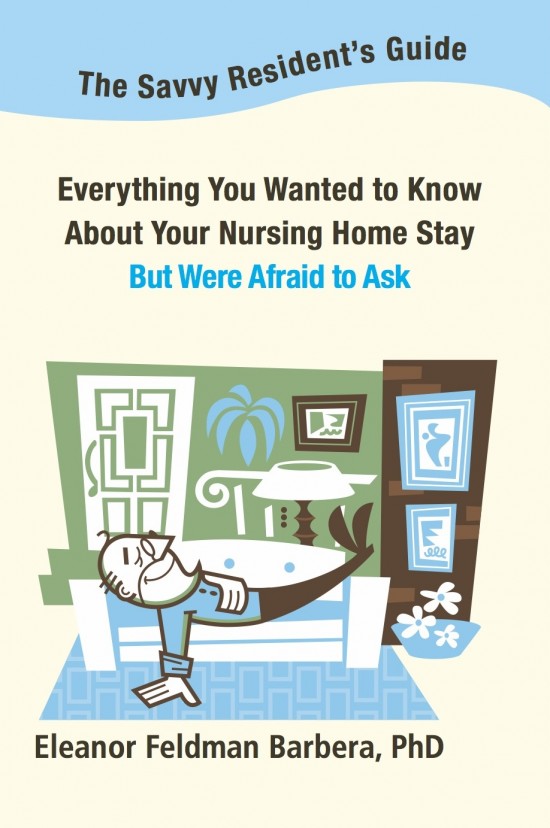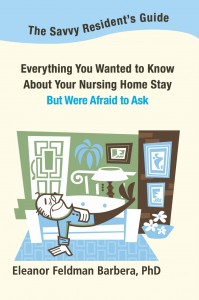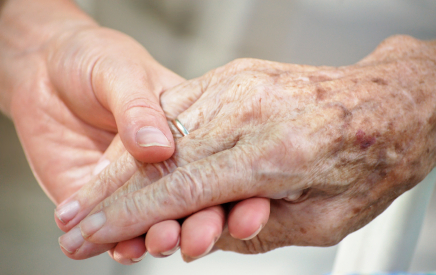Category: Role of psychologists
Posted by Dr. El - May 27, 2015 - Dementia, Engaging with families, McKnight's Long-Term Care News, Resident care, Role of psychologists

Here’s my latest article on McKnight’s Long-Term Care News:

A recent Iowa court case acquitted Henry Rayhons of sexually abusing his wife, who had Alzheimer’s dementia and lived in a nursing home. The case not only prompted national debate, it led those in long-term care to consider how to handle sexual activity within the bounds of their facility, particularly in cases when one or both of the parties have a diagnosis of dementia.
Psychologists are frequently asked to determine whether or not a patient has the capacity to understand or authorize various aspects of care, including their ability to consent to sexual behavior.
Eric Redlener, PhD, president of The PsychAssociates Group, a company that provides psychological services to long-term care facilities, held a meeting for its supervisors to discuss the challenges that arise when considering capacity, sexual activity and the senior living environment.
I was on the conference call since I work for them regularly. Here is a fly-on-the-wall account of the concerns raised during the meeting.
Staff issues
Some of the challenges to handling sexual behavior in the long-term care environment involve the reactions of staff members to the situation.
· Some staff members show squeamishness about “Grandma and Grandpa” having sex.
· Staff members may be concerned, rightly or wrongly, that residents will be taken advantage of.
· Staff members project their notion of sex onto elders. Elders may be content with holding hands or heavy petting, but staff might be anticipating people “swinging from the rafters.”
· Sometimes an administrator or director of nursing bans sexual activity among the residents, considering it “bad behavior,” despite the fact that it’s a legal right in many states for residents to be able to engage in sexual relations within a long-term care facility.
Family concerns
The reaction of family members to the romantic/sexual involvement of their elders can vary greatly.
· Some family members are able to accept their loved one’s need for intimacy, despite its sometimes unexpected expression, such as when an elderly heterosexual mother spends time cuddling with another woman on the floor, or a husband with dementia becomes involved with a woman who is not his wife.
For the entire article, visit:

Posted by Dr. El - January 28, 2015 - Role of psychologists, Talks/Radio shows

I hope you’ll join me tomorrow, 1/29 when I speak about my work as a psychologist in long-term care with Lisa Singer in her Open Forum radio show on Women’s Radio Network.
Time: Thursday, January 29th, 12 noon ET
Place: Open Forum with Lisa Singer, WRNW1

Posted by Dr. El - November 26, 2014 - Inspiration, McKnight's Long-Term Care News, Personal Reflections, Role of psychologists

Here’s my latest article on McKnight’s Long-Term Care News:

Every year as Thanksgiving approaches, I take a special moment for gratitude and to reflect on the many blessings of my life. I owe a lot of them to working in long-term care, and my LTC career is a blessing in itself.
1. I get the chance to learn from experience — other people’s experience. Talking to elders gives me insight about what leads to happiness and what doesn’t. I’d like to think this has spared me a few mistakes along the road.
2. LTC has improved my perspective. On days when I feel the weight of too many tasks to accomplish, I remember how lucky I am to be physically capable of taking care of my responsibilities. This allows me to focus on constructing a life I’ll be able to look back on with satisfaction when I’m 85 years old.
3. I’m told regularly how much I’m appreciated. Residents express their gratitude for my assistance in various ways. It could be a beaming smile at my approach, finding out from a family member that I’m talked about all the time, or a warm comment like, “I don’t know what I’d do without you.” It’s a good reason to get to work every day.
4. Little things make people so happy. Cleaning off a pair of smudged eyeglasses or changing a clock battery can turn me into a hero. It’s really easy and feels really good.
For the entire article, visit:

Posted by Dr. El - October 10, 2014 - Anecdotes, Common Nursing Home Problems and How Psychologists Can Solve Them, Role of psychologists

“I’M THE NEW PSYCHOLOGIST,” I screamed. “DO YOU HAVE A HEARING AID?”
“What?” Ms. Oakes replied.
The rest of our first session went downhill from there. I stopped at the nursing station on the way off the unit. “She never wears her hearing aid,” the nurse reported. “I’ve got it right here but she refuses.”
The following Thursday I approached Ms. Oakes with the hearing aid box in my hand. “I’M GOING TO PUT THIS IN, OKAY?” I pointed to the box, to my ear and then hers.
“All right.” She allowed me to fumble with the device and stick it in her ear.
“Can You Hear Me?”
“You want to know if I can hear you? Yes.” She looked worried. “I can’t find my glasses.”
“When Was The Last Time You Had Them?” I asked.
“When the girl took me for a shower this morning.” A pair of unmarked glasses in the shower room could disappear forever.
“I’m Going To Look For Them. I’ll Be Right Back.”
I returned a couple of minutes later with the glasses in my hand.
Ms. Oakes looked at me with amazement. “Lord a mercy, I didn’t ever think I’d see them again!”
I cleaned them off and slid them into place. She beamed.

Posted by Dr. El - September 4, 2014 - Common Nursing Home Problems and How Psychologists Can Solve Them, Dementia, McKnight's Long-Term Care News, Medication issues, Role of psychologists

Here’s my latest article on McKnight’s Long-Term Care News:

With the mandate to reduce the use of antipsychotics, many facilities are looking for alternative methods to address the behaviors often associated with dementia. There are several good resources available for training staff (such as the Center for Medicare & Medicaid Services’ Hand in Hand toolkit and the Pioneer Network’s programs).
Within each facility is another good resource — your consulting psychologist. Here’s how psychologists can help:
1. Psychology is all about nonpharmocological alternatives. The most frequent question for any psychologist during their career is, “What’s the difference between a psychologist and a psychiatrist?”
The answer: “Psychiatrists go to med school and prescribe medications to help people feel better. Psychologists go to graduate school to study interpersonal interactions and talk with people to help them feel better.”
The cornerstone of what psychologists do is to look at behavior and find ways to treat people without medication. While psychologists might not be able to use the exact same techniques for those with memory loss, they can offer behavioral insights that aid the team.
2. Psychologists are trained to understand group dynamics. They can support ways in which your treatment teams are working well to help those with dementia and offer alternatives in areas where conflicts arise. For example, if psychologists have observed that mealtimes are stressful for staff and residents, they can offer suggestions that reduce triggers for behaviors on the part of persons with memory loss.
3. As part of their studies, psychologists collect and synthesize data. Combined with their group/team experience, this makes psychologists ideal sleuths to gather information from various team members about particular residents and identify the cause(s) of agitation.
The fact that they don’t necessarily leave at change of shift allows them the opportunity to discuss the cross-shift behaviors of the residents.
For the entire article, visit:

Posted by Dr. El - April 3, 2014 - Business Strategies, Common Nursing Home Problems and How Psychologists Can Solve Them, Dementia, McKnight's Long-Term Care News, Role of psychologists

Here’s my latest article on McKnight’s Long-Term Care News:

I watched with dismay as the nurse abruptly moved a table in front of a confused and agitated resident trying to leave the dining room. “Sit down!” she told him in a stern voice. “Dinner will be here in an hour!”
Those of us in long-term care have undoubtedly witnessed similar incidents where residents become agitated and staff members don’t have the tools to prevent or manage their distress. Psychologists — who could offer such tools — are largely limited in the current reimbursement model to providing individual services to cognitively intact residents.
Using mental health expertise
The Eldercare Method, developed by psychologist Kelly O’Shea Carney, PhD, CMC, executive director at the Phoebe Center for Excellence in Dementia Care in Pennsylvania, harnesses the training of mental health professionals to successfully address the gap between what’s known in the mental health world about how to handle challenging behaviors and how they’re often managed in long-term care.
The method uses interdisciplinary teams facilitated by mental health professionals (psychologists and licensed clinical social workers) to examine the causes of resident distress and to identify ways to prevent it. Team members include representatives from the nursing department and other direct care staff such as dietary, housekeeping, and aides.
Needs assessment
The first step in the Eldercare Method is to assess the overall behavioral health needs of the facility and to establish training programs and annual service goals. This dramatically increases the focus on behavioral health as compared to facilities that provide behavioral health training sporadically, often after an incident occurs, missing the opportunity to prevent problems on an ongoing basis.
For the entire article, visit:

Kelly O’Shea Carney, PhD, CMC

Posted by Dr. El - January 30, 2014 - Role of psychologists

Before I started working as a psychologist in long-term care, I got some excellent training from the Alzheimer’s Association which focused on dementia care, and I took a helpful course from a practicing long-term care psychologist which reviewed typical care issues and billing concerns.
Despite this training and having worked in two psychiatric hospitals, a college counseling center, two residential treatment centers for adolescents, a high school, an outpatient clinic, a substance abuse center, managed care, and a crisis intervention center, I’d never encountered the situations I came across in the nursing home and felt at a loss at times. Below are some of the books and websites I found helpful early on, and some I wish had been available when I first began my work in long-term care. (I also took a weekend-long course in thanatology — the study of death — because it was hard to handle at first.)
Handbook of Health and Behavior: Psychological Treatment Strategies for the Nursing Home Patient, by Joseph M. Casciani, PhD — This user-friendly handbook outlines medical conditions typically seen in long-term care, common reactions to them, and treatment strategies to address them. Dr. Casciani also offers training at Concept Healthcare.
Psychotherapy with Older Adults, by Bob G. Knight, PhD — An excellent outline of psychotherapeutic issues with older adults in general, the book offers a helpful window into the emotional reactions of both therapist and patient.
Life Worth Living: How Someone You Love Can Still Enjoy LIfe in a Nursing Home, by William H. Thomas, MD — Dr. Thomas is founder of the Eden Alternative and has written extensively on transforming the culture of the nursing home. I read this book early in my career when I was wondering why so little attention was being given to the emotional environment compared to the mental health settings in which I’d worked. For more from Dr. Bill Thomas: ChangingAging.org.
Dementia Beyond Drugs: Changing the Culture of Care, by G. Allen Power, MD — Dr. Power works with the Pioneer Network and his book illustrates that the environment is contributing more to the problems nursing home residents experience than workers in most “typical” facilities realize. He outlines how to undertake a complete transformation. This book will confirm your observations as a psychologist.
Hiding the Stranger in the Mirror: A Detective’s Manual for Solving Problems Associated with Alzheimer’s Disease and Related Disorders, by Cameron J. Camp, PhD — Dr. Camp offers a host of suggestions on how to work with residents who have dementia in this engaging, easy to read volume. This will be the book you recommend to staff members (especially aides and nurses) because we as psychologists aren’t generally able to help staff with residents with dementia in the current reimbursement system.
The Savvy Resident’s Guide: Everything You Wanted to Know About Your Nursing Home Stay But Were Afraid to Ask, by Eleanor Feldman Barbera, PhD — I’d be remiss if I didn’t include my own book on the list. If you want a very practical and quick outline of resident concerns and how to handle them, as well as a resource to provide residents and families, please take a look: The Savvy Resident’s Guide.
WEBSITES for psychologists:
Psychologists in Long-Term Care — a group of dedicated professionals who share their experience and wisdom via the listserv. A must-join.
GeroCentral — The collaborative effort of a number of different psychology organizations, the website has links to all of them and to a vast number of resources. Well worth reviewing.
APA’s Resources for Psychological Practice With Older Adults and Their Caregivers — This flyer from APA’s Office on Aging provides a concise list of resources available from APA. More resources can be found at: APA Office on Aging

Posted by Dr. El - January 13, 2014 - McKnight's Long-Term Care News, Personal Reflections, Role of psychologists, Stress/Crisis management

Here’s my latest article on McKnight’s Long-Term Care News:

In my last post, I wrote about some of the many things I do for residents as a long-term care psychologist. The astute reader will note that most of the tasks were accomplished during work hours and within the facility. There’s a reason for that.
When I first started out as a shrink, I worked at the Manhattan Psychiatric Center, a setting similar to many nursing homes in that residents didn’t have access to stores and other amenities. “Next time you’re in the supermarket, will you get me some of that lotion I like?” “Can you buy me a new watch battery?”
The small requests were never-ending and because they were so small, I felt I couldn’t refuse.
And then there were the tasks I volunteered for because I could see the need and I was, you know, a nice person.
The breaking point came after I offered to darn a sweater with a small hole in the front. It was only after I got the sweater home that I discovered the large holes in the back. During the hours of mending — I didn’t want to go back on my word — I realized I had to set some limits on these “extras” or I’d quickly burn myself out on my chosen career.
Establishing limits
Knowing I was in this for the long haul, I created a personal “no errands” policy. The exceptions are endeavors that connect residents to their loved ones, such as obtaining and mailing out holiday cards. (And, I admit, I relish Internet searches for estranged family members.) On the occasions where I’m tempted to do something really special, I soul-search and sometimes consult with an advisor to determine if it’s something I’d do for any of my residents or if I’m going too far for one particular person. It’s important to be fair, especially in the “small-town” LTC environment.
Potential for burnout
For the entire article, visit:

Staying in balance while leaning on each other
Posted by Dr. El - January 2, 2014 - Anecdotes, Customer service, Role of psychologists

Here’s my latest article on McKnight’s Long-Term Care News:

Many of us in long-term care think of our jobs as a calling. We handle the day-to-day tasks and the business as usual but also get a lot of energy and joy out of taking our work one step further. Here are some actions I’ve taken that have enriched my patients and my role as a psychologist.
1. Set up Facebook accounts so residents can stay connected with their friends and family members.
2. Searched through their charts to find out the outcome of a medical consult.
3. Followed up with the nurse if the recommended course of action wasn’t pursued.
4. Cleaned out messy closets and drawers to give the resident some sense of control.
5. Searched for missing items (and found 90% of them!).
6. Attended one patient funeral early on in my nursing home career, where I sobbed from the moment I entered the room until the moment I left. Never again have I gone.
7. Tracked down and reunited missing family members.
For the entire article, visit:

Posted by Dr. El - September 20, 2013 - Business Strategies, Common Nursing Home Problems and How Psychologists Can Solve Them, Depression/Mental illness/Substance Abuse, McKnight's Long-Term Care News, Role of psychologists, Transitions in care

Here’s my latest article on McKnight’s Long-Term Care News:

Of the most efficient countries for healthcare, the United States ranks second in healthcare costs per capita but 46th in efficiency (out of the 48 countries ranked!). The move from a biomedical to a biopsychosocial model of healthcare might be able to change that.
Consider the following scenario: Estelle’s fall at home sent her to the hospital. She was diagnosed with a hip fracture and diabetes and transferred to the nursing home for short-term rehab. A biomedical model would treat both conditions and send her home again. A biopsychosocial model would also address her need to make dietary changes, her fears of falling again, the alcoholism that contributed to both her diabetes and her fall, and her noncompliance with the rehab staff.
From biomedical to biopsychosocial
In her American Psychological Association presidential address, psychologist Suzanne Bennett Johnson discussed the change from a biomedical model of care to a biopsychosocial model of healthcare. The biomedical model of care that has “dominated Western medicine … for over 100 years” focuses solely on biologic factors to understand illness. It’s resulted in cures for infectious illnesses such as tuberculosis, pneumonia, and influenza, and increased life expectancy from 49 years in 1901 to 77 years in 2001. The biomedical model has been a great success in many respects.
As Johnson points out, however, “while infectious disease was the leading cause of death in 1900, today most Americans die of chronic disease: heart disease, cancer, chronic lower respiratory diseases, and stroke.”
Underlying these diseases are behaviors such as smoking, poor dietary habits, sedentary behavior, and substance abuse. In addition, she notes, “as many as 40% of medical patients are co-morbid for a mental health disorder and as many as 75% of seriously mentally ill patients are co-morbid for a physical health disorder.”
Implications for LTC
Clearly, in order to reduce chronic disease in this country (and to decrease medical costs), we need to address the behaviors – the psychological and social factors — underlying the diseases. But we work with elders, you might say, the damage caused by years of poor self-care has already been done! Perhaps.
But as a psychologist talking with seniors over the years, I’ve found that many of my lovely old dogs were ready for new tricks. We need to intervene, however, in certain key ways:
For the entire article, visit:
























